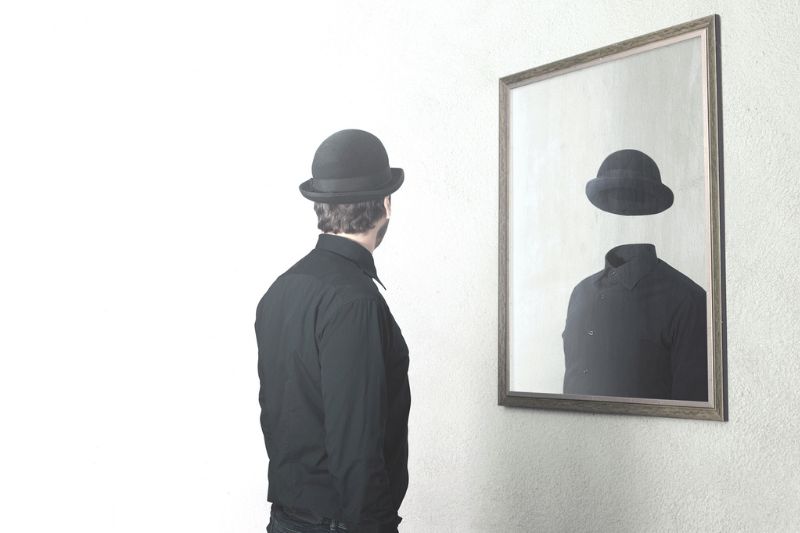Write for Eureka Street? I don’t know. That's a proper, grown-up magazine. Serious business. I definitely don’t belong and any other time I got a piece published there was a total fluke. If I try again, I’ll get found out for sure. And who am I to speak as an authority on a subject? Oh no. Ick ick ick. ‘Oooh. Look at me! I know something!’ Who do I think I am? Ew. No. No thank you.

Do you get imposter thoughts? Do you have an inner critic who has nasty things to say whenever you set out to create? It’s not unusual, especially among women. Forbes reports that 75 per cent of executive women experience imposter syndrome throughout their career, while a commercially-funded study notes that 60 per cent of women put off starting a business due to imposter syndrome.
Incidentally, I prefer ‘imposter thoughts’ to ‘imposter syndrome’. It makes it seem more treatable, rather than a chronic condition. Also, ‘imposter syndrome’ tends to put the blame and responsibility on the victim, without examining the social structures that might allow such feelings to flourish.
If you are looking for a fun activity that will bring you into constant confrontation with your inner critic, write a novel. I did that. Here’s what I learnt along the way.
It helps to give your critic a name. I pictured a cranky old man named Stanley. When I started thinking ‘this is rubbish and YOU are rubbish!’ I’d say, ‘that’s enough, Stanley!’ and press on.
Permission-seeking is a waste of time. If you write, you are a writer. Stop hand-wringing. It helped me to set the bar low. This might be my practice novel. This might just be something I show my family for fun. And that’s okay. By all means, do the courses and read the books. But start the novel or writing project first. Don’t wait until you have a qualification before you are allowed to write.
It’s confronting to see someone else achieve their creative goals. It’s very tempting to itemise the reasons why they have it easier than you. They don’t have kids. They have a different job. They are in good health. They are neurotypical. It feels briefly satisfying to make a long mental list of why it’s easy for them and hard for you. It’s also a total timewaster. Put that energy into your creative work instead. So what if it’s harder for you? Do it anyway.
'Permission-seeking is a waste of time. If you write, you are a writer. Stop hand-wringing.'
It’s easy to fantasise — if only I didn’t have all of these responsibilities, if only I lived full-time in a beautiful cabin in the woods, THEN I could write something. No you couldn’t. You need to be out in the world to get material. Work in the situation you are already in. Don’t wait for things to quieten down. They won’t.
Give yourself permission to create rubbish. Just go ahead and write a terrible scene. Maybe you need to get the bad writing out of your system before the good writing starts to flow. Maybe you just need to get something on the page that you can fix later. It still blows my mind that the scenes my editor liked best of all started life as terrible writing with gaps and frayed edges. You can work with terrible. You can’t work with blank.
The need for perfect conditions is a waste of time. You don’t need perfect conditions. You want them. And that’s okay. But don’t let it get in the way of your writing. When Melbourne went into lockdown and my usual haunts of libraries and cafes were off-limits, I never thought I could get into the same state of flow in the tent-study my husband set up around the side of the house. But I turned up anyway. Pretty soon the smell of tent canvas was exactly what I needed to get into the mood to write.
Taking social risks is a huge part of creative work. So email that mentor to start the conversation up again when it has gone quiet. Turn up to writer talks at libraries all by yourself and introduce yourself afterwards. Put yourself out there on social media. Describe yourself as a writer at social events. Are you wincing yet? I don’t care! Grit your teeth and do it!
The sad news is that writing the novel doesn’t fix the imposter thoughts. Sure, I got away with it the first time, but my second novel? My second novel is rubbish! Why did I ever think I could do this? And who am I compared to some of these other writers? These other writers are SO GOOD.
My inner critic still hangs about. He has plenty to say as I work (‘You’re a one-hit-wonder!’ ‘You don’t know what you’re doing!’) but that’s okay. I’ve figured out something about my inner critic somewhere along the way. He’s not actually a cranky old man, judging me from on high. She’s an insecure 12-year-old, voicing her anxieties out of fear. She pipes up sometimes and rattles on and I thank her for her input and tell her she doesn’t need to be scared. She’s allowed to be in the car with me. She is not allowed to drive the car.
Kate’s novel, Tuesday Evenings with the Copeton Craft Resistance (by Kate Solly) is available where all good books are sold.
Main image: Man in front of mirror reflecting himself without face. (Francescoch / Getty images)